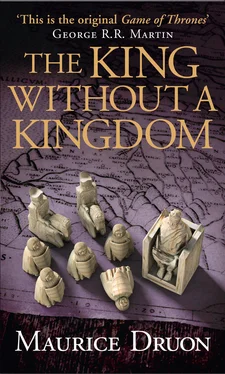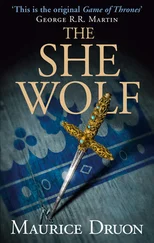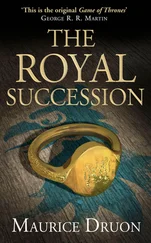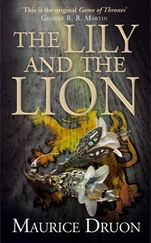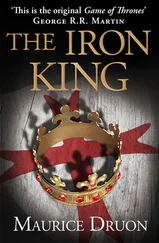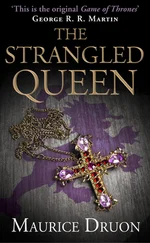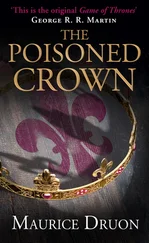What a strange creature is man! When everything goes his way, when he is blooming with health, when his business is flourishing, his wife fertile and his province in peace, isn’t it precisely then that he should constantly lift up his soul unto the Lord and give thanks for such blessings? Not at all; he is quick to forget his creator, proudly flying in the face of all the commandments. However, as soon as misfortune and disaster strike, then he rushes to God. And he prays, and admits his guilt, and he promises to mend his ways. God must be right to burden him, since it is the only way, or so it seems, to bring man back to Him.
I didn’t choose my condition. It was my mother, perhaps you know, who designated me when I was a child. If I accepted this fate, it was, I believe, because I have always been grateful to God for all He has given me, especially, the gift of life. I remember, when I was very young, in our ancient castle in Rolphie, Périgueux, where you yourself were born, Archambaud, but which is no longer home to you since your father chose to take up residence in Montignac fifteen years back … well there in that huge castle, set amongst the ancient stones of a Roman arena, I remember the wonder that filled me suddenly, the wonder of being alive at the centre of the big, wide world, to breathe, to see the sky; I remember this feeling came to me on summer evenings, when the light is long and I was put to bed well before nightfall. The bees buzzed in a vine that climbed the wall beneath my room, the shadow slowly filled the oval courtyard with its enormous stones; birds flew across the still-light sky and the first star appeared amidst the rose-tinged clouds. I had a great childish need to say thank you, and my mother made it clear to me that it was to God I should give thanks, the Organizer of all this beauty. And that thought has never left me.
On this very day, all along our route, often I feel a thank you in my heart for this warm weather, for these russet-coloured forests we ride through, for these still-green pastures, for these loyal servants who escort me, for these fine, fattened horses that I see trotting alongside my palanquin. I enjoy watching the faces of men, the movements of the beasts, the shapes of the trees, all this infinite variety that is the infinitely wonderful work of God.
All our doctors who fight over theology in closed classrooms, and cram themselves full of empty words, and shout bitter abuse at each other, and who bore everyone to death inventing words to name otherwise what we already knew before them, all of these people would be better off contemplating nature, thereby healing their minds. I have the theology that I was taught, handed down from the fathers of the Church; and I have no desire to change it …
Did you know that I could have been pope? Yes, my nephew. Many tell me so, as they tell me that I could yet be pope if I outlast Innocent. It will be God’s will. I do not complain about what he has made me. I thank him that he put me where he has put me, and that he has kept me on to be the age I am, an age that few attain: fifty-five years, my dear nephew, that is my age, and in as fine form as you see me. That is also the Lord’s blessing. Those whom I haven’t met for ten years cannot believe their eyes: that I have changed so little in appearance, my cheeks still as rosy, and my beard scarcely whitened.
The idea of being made or not being made pope only bothers me, in truth – I confide this to you as a relative – when it occurs to me that I could act more wisely than the one who wears the papal tiara. And yet I never had that feeling with Clement VI. He fully understood that the pope should be a monarch above all monarchs, God’s right-hand man. On a day when Jean Birel or some other preacher of asceticism accused him of being too extravagant, and too generous to the supplicants, he responded: ‘Nobody should leave the prince’s company dissatisfied.’ And, turning to me, he added between his teeth: ‘My predecessors didn’t know how to be pope.’ And during the Great Plague, as I was saying, he really proved he was the best. I don’t believe, in all honesty, that I could have done as much as he, and I thanked God, once again, that He hadn’t designated me to lead an ailing Christendom through this ordeal.
Not once did Clement abandon his majesty; and indeed he demonstrated that he was the Holy Father, the father of all Christians, and even father to all others, as when peoples almost everywhere, but especially in the Rhineland provinces of Mainz and Worms, turned against the Jews, accusing them of causing the scourge, he condemned such persecutions. He went further and took the Jews into his own protection; he excommunicated their tormentors; he offered asylum to the hounded Jews and relocated them within his states, where it must be said they re-established prosperity in just a few years.
But why was I going on so long about the plague? Ah, yes! Because of the dire consequences it had for the French crown, and for King John himself. Indeed, towards the end of the epidemic, during the autumn of 1349, one after the other, three queens, or rather two queens and one destined to be …
What are you saying, Brunet? Speak louder. Bourdeilles is in sight? Ah, yes, I want to see that. It is a stronghold indeed, and the castle well placed to monitor those approaching from afar.
There it is, Archambaud, the castle my younger brother, your father, gave up to me to thank me for liberating Périgueux. While I haven’t succeeded in freeing King John from the hands of the English, at least I saved our county town from their clutches and re-established our authority here.
The English garrison, you remember, didn’t want to leave. But the lances that accompany me, and which certain people make mockery of, proved themselves once again most useful. It was enough for me to appear with them, coming from Bordeaux, for the English to pack up and leave without further ado. Two hundred lances and a cardinal, it is quite something to see … Yes, most of my servants have been trained for combat, as well as the secretaries and the doctors of law that travel with me. And my faithful Brunet is a knight; I obtained his ennoblement not long ago.
In the end, by giving me Bourdeilles, my brother is strengthening his position. Because with the castellany of Auberoche, near Savignac, and the walled town of Bonneval, near Thenon, that I bought for twenty thousand florins from King Philip VI ten years ago … well I say bought, but in reality it offset in part the sums that I had loaned him … and with the fortified Abbey of Saint-Astier, of which I am the abbot, and my priories of Fleix and Saint Martin of Bergerac, that now makes six fortresses at a good distance all around Périgueux which belong to a high representative of the Church, almost as if they belonged to the pope himself. And one would be reluctant to cross swords with him. That is how I keep the peace in our county.
You know Bourdeilles, of course; you have come here often. I haven’t been here for a long time. Fancy that, I don’t remember that great octagonal keep. It cuts a fine figure indeed. Here we are at last, this is mine, but only to spend one night and one morning, the time it takes to install the governor I have chosen, without knowing when or whether I would return. It is too short a break to enjoy. Well let us thank God for this time that he has given me here. I hope they have prepared us a good supper, travelling gives you quite an appetite, even in a palanquin.
3
Death knocks on every door
I KNEW IT, MY NEPHEW, I told you so, today we shouldn’t count on going further than Nontron. And even so we will only arrive there long after evensong, in the black of night. La Rue kept on at me: ‘Monseigneur is losing ground, monseigneur will not be satisfied with a stage of just eight leagues …’ Oh yes! La Rue always goes like the clappers. Which is no bad thing at all, as at least with him my escort never dozes off. But I knew that we wouldn’t be able to leave Bourdeilles before midday. I had too much to do, too much to decide upon, too many signatures to dispense.
Читать дальше
